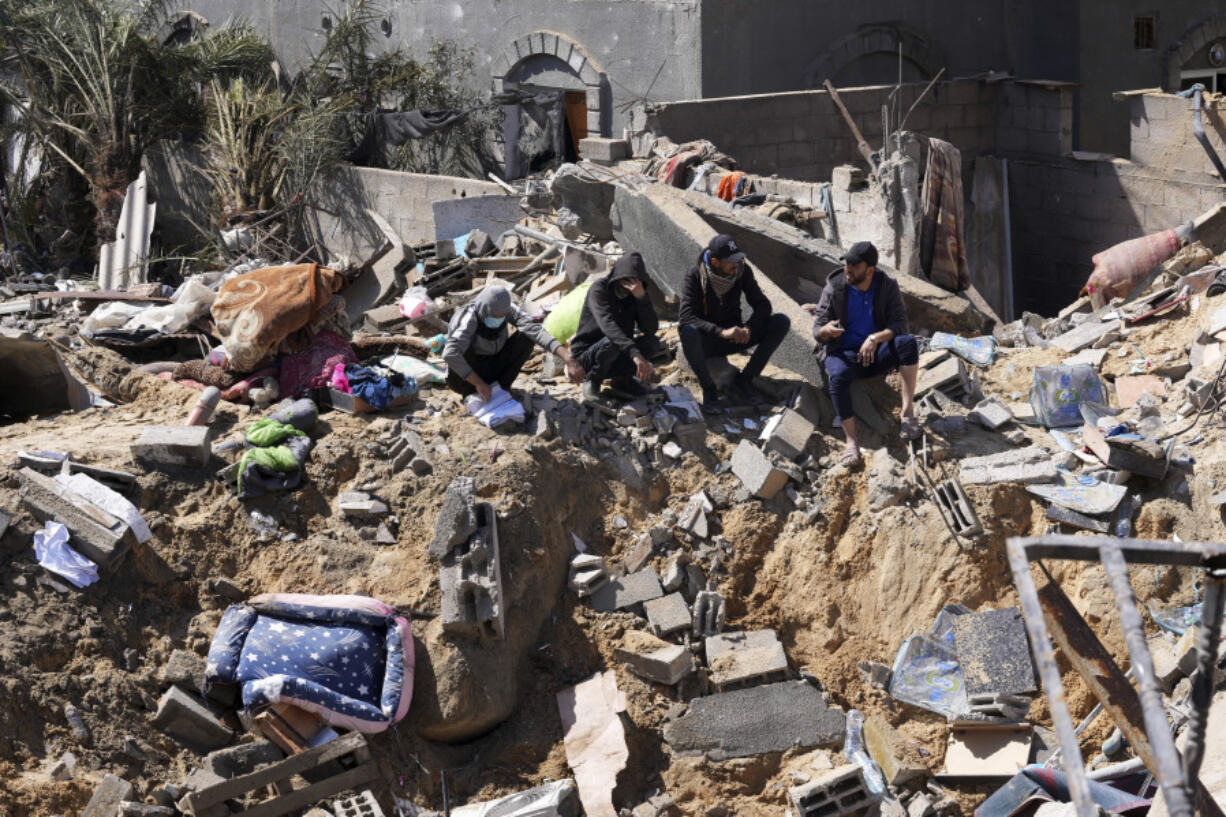CAIRO (AP) — Hamas said Thursday that its delegation has left Cairo and that talks on a Gaza cease-fire and hostage release will resume next week, making it extremely unlikely that mediators will broker a deal before the Muslim holy month of Ramadan.
Mediators had looked to Ramadan as an informal deadline because the month of dawn-to-dusk fasting often sees Israeli-Palestinian violence linked to access to a major Jerusalem holy site. The war already has the wider region on edge, with Iran-backed groups trading fire with Israel and the United States.
Egyptian officials had earlier said the negotiations had reached an impasse over Hamas’ demand for a phased process culminating in an end to the war. But they did not rule out a deal before Ramadan, which is expected to begin on Sunday.
Hamas spokesman Jihad Taha said Israel “refuses to commit to and give guarantees regarding the cease-fire, the return of the displaced, and withdrawal from the areas of its incursion.” But he said the talks were still ongoing and would resume next week. There was no immediate comment from Israel.
The U.S., Egypt and Qatar have been trying for weeks to broker an agreement on a six-week cease-fire and the release of 40 hostages held in Gaza in exchange for Palestinians imprisoned in Israel.
The Egyptian officials said Hamas has agreed to the main terms of such an agreement as a first stage but wants commitments that it will lead to an eventual more permanent cease-fire. They say Israel wants to confine the negotiations to the more limited agreement.
The officials spoke on condition of anonymity because they were not authorized to discuss the negotiations with media. Both officials said mediators are still pressing the two parties to soften their positions.
Hamas has said it will not release all of the remaining hostages without a full Israeli withdrawal from the territory. Palestinian militants are believed to be holding around 100 hostages and the remains of 30 others captured during Hamas’ Oct. 7 attack into Israel that triggered the war.
Hamas is also demanding the release of a large number of prisoners, including top militants serving life sentences, in exchange for the remaining hostages.
Hamas is believed to be holding the hostages deep inside its vast tunnel network, where rescue operations would be virtually impossible, and using them as human shields for its top leaders. It hopes to use them as bargaining chips to end the war on its terms.
That poses a major dilemma for Israel, which at some point may have to choose between its two main goals of bringing back the hostages and trying to annihilate Hamas.
Israeli Prime Minister Benjamin Netanyahu has publicly ruled out Hamas’ demands, saying Israel intends to resume the offensive after any cease-fire, expand it to the crowded southern city of Rafah and battle on until “total victory.” He has said military pressure will help bring about the release of the hostages.
Ramadan is a time of heightened prayer, reflection and charity for Muslims the world over, who hold festive nightly gatherings with family and friends after fasting ends at sundown. The lunar month is expected to begin Sunday or Monday, depending on the sighting of the moon.
In past years, Israeli forces and Palestinians have clashed in Jerusalem over access to the Al-Aqsa mosque compound, the third holiest site in Islam. The hilltop on which it is built is the holiest site for Jews, who refer to it as the Temple Mount because it was the location of the Jewish temples in antiquity.
Hamas says it launched the Oct. 7 attack partly in response to what it sees as Israel’s encroachment on the site and has called for heightened confrontations with Israel during the holy month. Israeli authorities say access to the site will remain unchanged from previous years.
Hamas-led militants killed some 1,200 people, mostly civilians, and captured another 250 when they stormed across the border on Oct. 7. Over 100 hostages were released in a cease-fire deal last year.
Israel launched a massive air, land and sea campaign in Gaza that has driven some 80% of the population from their homes and pushed hundreds of thousands to the brink of famine.
Gaza’s Health Ministry says at least 30,717 Palestinians have been killed. It does not differentiate between civilians and combatants in its tallies but says women and children make up around two-thirds of those killed. The ministry, which is part of the Hamas-run government, maintains detailed records and its casualty figures from previous wars have largely matched those of the U.N. and independent experts.
Israel says it has killed over 13,000 Hamas fighters, without providing evidence. It blames the high civilian death toll on Hamas because its fighters operate in dense, residential neighborhoods.
Gaza is mired in a humanitarian crisis, and conditions are particularly dire in the north, where the offensive has caused widespread devastation. Many of the estimated 300,000 people still living there have been reduced to eating animal fodder to survive, and the U.N. says one in six children younger than 2 in the north suffers from acute malnutrition.
Facing global calls to alleviate the crisis, Israeli officials said Wednesday that it will begin allowing aid to move directly from its territory into northern Gaza and will also cooperate with the creation of a sea route from Cyprus.
Aid groups have said it has become nearly impossible to deliver supplies within most of Gaza because of the difficulty of coordinating with the Israeli military, the ongoing hostilities and the breakdown of public order. It is even more difficult to get aid to the north.



